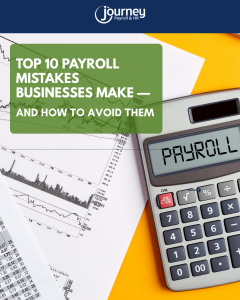Getting payroll right is essential for protecting your business, earning employee trust, and staying compliant. Here are the most common payroll mistakes, with practical tips to avoid them: 
- Misclassifying Workers
Mislabeling employees as independent contractors or exempt/non‑exempt can lead to major fines and back wages. Always review IRS and Department of Labor criteria and consult experts if you’re unsure.
- Incorrect Overtime Calculations
Overtime miscalculations often result from complex rules, shift differentials, or manual errors. Automate time tracking and train managers on correct approval procedures.
- Inaccurate Tax Withholding
Using outdated W‑4 forms or payroll system settings can result in wrong federal, state, or local tax deductions. Encourage employees to update their W‑4s and audit withholdings periodically.
- Missing Payroll Deadlines
Tardy tax deposits and filings can trigger penalties and interest. Maintain a payroll calendar, set automatic reminders, and establish backup processes for emergencies.
- Failing to Handle Garnishments Correctly
Missteps with court‑ordered deductions (e.g. child support or tax levies) expose you to legal liability. Use software that automates garnishment priority and regularly verify compliance.
- Poor Record-Keeping & Data Entry Errors
Inaccurate records, like mismatched names or hours worked, can lead to compliance penalties and payroll disputes. Implement a digital record-keeping system and perform regular audits.
- Mismanaging Paid Time Off (PTO)
Inconsistently tracking PTO or incorrectly paying out accruals can create trust issues and financial discrepancies. Use automated tracking software and communicate your PTO policy clearly.
- Errors in Final Paychecks
Failing to include unused vacation, commissions, or timely final paychecks can result in legal claims. Check state laws on payout timing and automate termination payroll processes where possible.
- Ignoring State and Local Tax Rules
Payroll tax obligations can change with geography. Missing local regulations can lead to penalties, especially for businesses operating in multiple jurisdictions. Use payroll systems that automatically update rates by location.
- Skimping on Expertise
DIY payroll or overreliance on outdated manual systems increases risk. Often, partnering with a provider or PEO (Professional Employer Organization) ensures access to compliance expertise, scalable services, and refined processes.
Why These Mistakes Matter
Financial impact: The IRS estimates nearly 40% of small businesses face payroll penalties averaging $845 per incident annually due to payroll errors.
Trust erosion: Even a single payroll mistake can damage employee morale and undermine faith in your leadership.
Compliance exposure: Missteps in classification, tax withholding, garnishments or pay timing can trigger audits, lawsuits, and severe penalties.
How Journey Payroll & HR Helps You Avoid These Pitfalls
At Journey Payroll & HR, we partner with businesses to deliver payroll solutions that eliminate error-prone manual work and keep you compliant with ever-changing regulations. Here’s how we help:
Accurate Classification & Pay Processing
Automated Garnishments, PTO Tracking & Final Pay
Full Tax Compliance (federal, state & local updates applied automatically)
Transparent Record Keeping & Quarterly Audits
Dedicated Payroll & HR Support, including guidance on best practices
Final Thoughts
Payroll mistakes are costly, operationally, financially, and reputationally. Yet, with careful planning, technology, and expert support, they’re entirely preventable.
By choosing a modern payroll provider like Journey Payroll & HR, you get peace of mind, reduced compliance risk, and an empowered workforce.